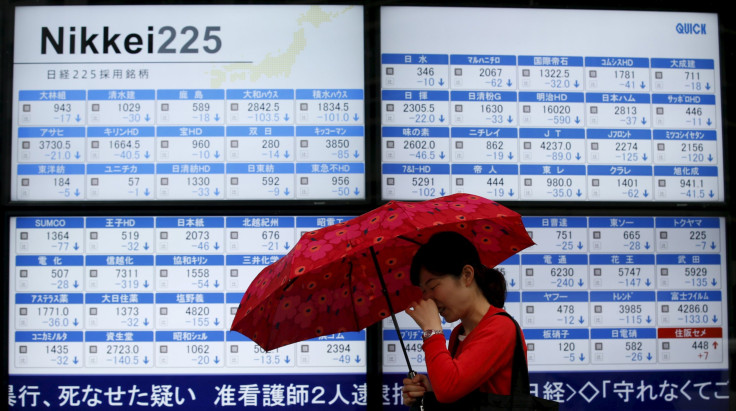Dow Jones Industrial Average Points Lower, Asian Stocks Slide As Brexit Vote Fallout Continues

Asian stocks opened weaker and the British pound fell almost 2 percent in trading on Asian markets Monday, as the global uncertainty that followed the United Kingdom’s decision to leave the European Union last week continued to rattle global investors.
The shock result of the U.K.’s EU referendum last Thursday shook more than $2 trillion in paper wealth out of the global markets Friday, with MSCI’s broadest gauge of the world’s stock markets falling 4.8 percent, its biggest decline in nearly five years.
Among many questions the British exit, or Brexit, has triggered are just how much U.K. and European economies will slow, how they will negotiate their new relationship and how European leaders will try to boost the crumbling EU.
"We believe that markets will remain cautious, as uncertainty over exit negotiations causes risk averse sentiment to linger," George Davis, chief technical analyst at RBC Dominion Securities in Toronto, said in a note.
European investors are bracing for more market turmoil in the week ahead amid the unprecedented political uncertainty following the U.K.’s EU exit. On Friday, European stock markets fell sharply as investors worried about the uncertain outlook for the U.K.’s relationship with the EU and a coming period of uncertainty.
U.K. finance minister George Osborne is expected to make a statement Monday in a bid to provide reassurance of the nation’s financial and economic stability following the Brexit vote.
U.S. stock futures were lately pointing to another weak open Monday, and the British pound fell more than 1 percent in early Asian trade on Monday, as markets struggled to shake off a swathe of uncertainty sparked by Britain's decision to leave the EU.
Japan's Nikkei, however, rose 1.3 percent, a partial rebound after Friday's 7.9 percent fall. Other Asian indexes, such as Hong Kong's Hang Seng, were lower Monday.
"Given the huge trading volume on Friday, I suspect people have done at least the minimum amount of hedging they need to do," said a head of derivative trading at a Japanese brokerage firm.
"But we could see more selling in risk assets in the end. After all, Brexit doesn't really support appetite for buying stocks."
The British pound fell 1.9 percent to $1.3433, though it still kept some distance from the 31-year low of $1.3228 touched during Friday's wild trade.
Against the yen, sterling fell more than 2 percent to 136.85 yen. That was more than 14 percent below its levels early on Friday when investors believed the "remain" camp would win the referendum.
The euro also came under further pressure, falling 0.8 percent against the dollar, as investors fret Brexit could stoke the anti-establishment mood in Europe.
"[There will be] sell-off in the euro as talk of other exit referenda builds," said Jerome Booth, chairman of New Sparta Asset Management in London. "This sell-off will be more profound and long-lasting and will be not just against the dollar and yen but also against the pound. It will also raise fears of significant loss of values for holders of eurozone government bonds."
Oil prices fell more than 1 percent in early trade, with international benchmark Brent futures down 1.3 percent to $47.80 per barrel.
Demand for safe haven assets such as government debt and precious metals remained strong.
The 10-year U.S. debt yield dropped 8 basis points to 1.502 percent in early Asian trade. On Friday, it fell as low as 1.40 percent, near its record low of 1.381 percent marked in July 2012.
U.S. interest rate futures have completely priced out chance of a rate hike by the Federal Reserve this year and less than 50 percent chance of a rate hike even by late 2017.
Gold rose more than 1 percent to $1,334.50 per ounce.
Reuters contributed to this report.
© Copyright IBTimes 2025. All rights reserved.





















